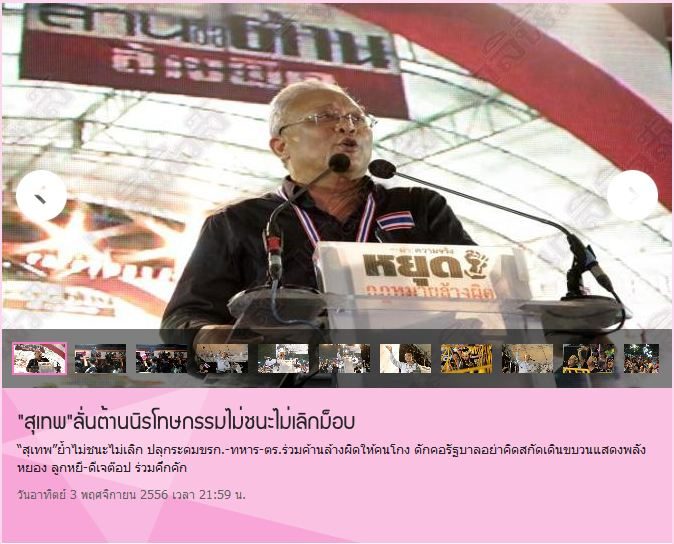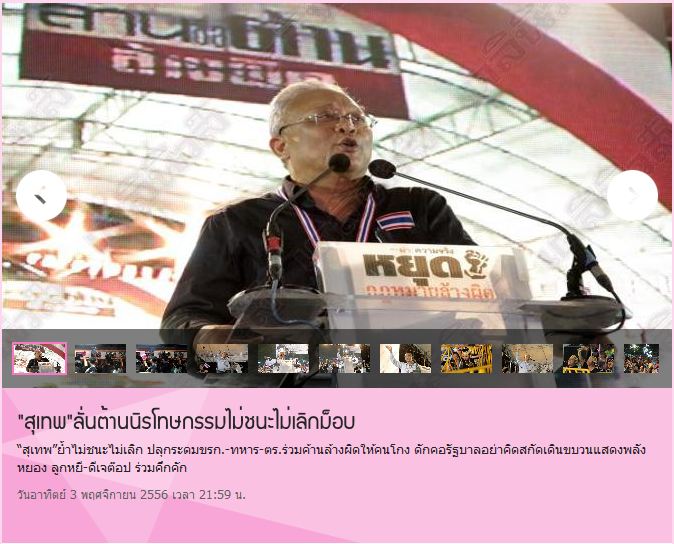Many years ago, back when I was just a kid, I had a chance to meet Suthep Thaugsuban. He was a senior government minister (it was the second Chuan Leekpai administration, for those keeping score) and I had been invited, quite unexpectedly, to a private meeting with him and other notables. At the time, I was happy to simply sit to one side and observe the interactions of the heavies. With my best southern Thai politeness I managed to navigate this “big meeting” and learned a couple of things about elite swagger. I walked away with the fanciest business card I’d ever seen.
Since that day I have always kept more of an eye on Suthep than would be expected. When he took charge of the hard-edge of Democrat Party push-back against the Red Shirts I would often think of the gregarious provincial spruiker that I had met all those years before. And what he had become.
When I saw him today, front-and-centre on the Daily News website, there was something about the pose, the “Stop” signage and the black shirt that got me thinking about history and its disjunctures.
*****
With the current jostling for position around the Pheua Thai Party’s amnesty bill, the country’s recent and unresolved history of political conflict has been resurrected. That past is selectively re-imagined and remembered for political effect, with everyone seeking to muscle in on the high-ground while they still can. Prime Yingluck Shinawatra appears to have been successful over the past two years at moderating the unease among other elite players. But how long could that last? History is now: its resurrection brings the prospect of new political crisis and conflict.
Indeed, if you take a look at these photos from today’s Thai Rath coverage, it feels like a visit to 2008, or 2005. We’ve got the nationalist, royalist iconography, paired with the same old slogans. We see the young men and their bandanas. Of course those of you who have been reading New Mandala for years already know that we have been here before.
*****
Fast-forwarding to November 2013: what’s going on? Is this the beginning of the next battle in the war between deposed former Prime Minister Thaksin and all those who oppose him? Has the time finally come? As the Bangkok Post reports it:
The official vote, then, was 310-0 with four abstentions to pass a bill providing amnesty to everybody for everything remotely political since 2004.
It was a remarkable achievement by the Pheu Thai leadership. In Thailand and in the worldwide Thai diaspora, just about 311 people could be found who actively supported the measure — the 310 in parliament and one man in Dubai. (Presumably, a few dozen more supporters are lurking in the Senate, which the bill must pass to become law.)
Former prime minister Thaksin Shinawatra’s son Panthongtae said on Facebook he did not want the blanket amnesty. Prime Minister Yingluck Shinawatra went to Lop Buri for the event, to make sure her vote was not recorded in favour. The Democrats were holding a rally against total amnesty. Businessmen, anti-corruption groups, the commander of the army, police officers — not a person more than 311 spoke in favour of the measure.
Those four abstentions? They were hard-core red shirts, three of them accused of terrorism and other violent crimes and now, under the law, about to be freed. They did not want amnesty.
It is a complicated picture, no doubt. But for so many of the amnesty bill’s opponents the main issue is a simple one: Thaksin lives outside gaol.
*****
So, where does this end? In today’s Nation a long report on recent anti-amnesty protests is followed by a quick summary of “what will be coming next”. It is a good overview of the variety of interests mobilising against the “Thaksin” amnesty. I am particularly taken with some of the protest tactics. The idea of besuited protesters on Silom blowing their whistles in displeasure is a striking one. As it happens we will need to wait until Saturday for “people with royal descent [to] express their stance”.
Others key events for the week include:
Today (November 4)
- 9.30am, Core members of the Council of University Presidents of Thailand will convene a meeting to plan its next step in regard to its opposition to the Amnesty Bill.
- 10am, Opponents of the bill will converge with Democrat Party leaders in Samsen in Bangkok. Marches are likely.
- 12.30pm, The Business Club for Democracy will organise a rally on the footpath in Silom Road. They plan to blow whistles.
- 2pm, The Joint Standing Committee on Commerce, Industry and Banking will announce its stance.
- 2pm, The Thai Chamber of Commerce will announce its stance.
- 3pm, Thammasat University will call on the Senate, asking it to reject the Amnesty Bill.
Tomorrow (November 5)
- 4pm, The Chula Network for Morality will hold a rally at Chulalongkorn University to express opposition to the Amnesty Bill.
Wednesday November 6
- Lecturers and students from Mahidol University will join the rally at Urupong Intersection.
Thursday November 7
- Alumni of Thammasat University will call on the Senate president to express their opposition against the Amnesty Bill.
- 5pm, The Group of 40 Senators will announce their stance against the Amnesty Bill at the Democracy Monument.
Friday November 8
- The Anti-Corruption Organisation of Thailand will announce its stance.
Saturday November 10
- Noon, Sombat Boon-ngarm-anong will organise the “10,000 Up” rally at Ratchaprasong Intersection to denounce the Amnesty Bill.
- People with royal descent will express their stance.
And so the maneuvering continues. There is talk of an early election. And the background hum of coup chatter. In one of his characteristically wordy essays Andrew MacGregor Marshall writes of “Thailand’s era of insanity”. It is a primer on everything that has come before. But is what we see today, in fact, just the rational response of those who can’t win Thailand’s elections? They have form.
*****
For mine, it looks like the festering wounds are starting to get some attention and, to push the analogy, the surgeons aren’t in agreement on the best course of action. Given what is at stake, détente could only last so long.
This leads to questions about what happens next. With the wounds proving unlikely to heal by themselves, will the doctors determine the patient can be saved from further trauma? Or, based on previous surgical experience, is something more drastic going to be the treatment of choice? In other words, as Thailand returns to deal with its past, will the future be what has happened before?
 Facebook
Facebook  Twitter
Twitter  Soundcloud
Soundcloud  Youtube
Youtube  Rss
Rss 
